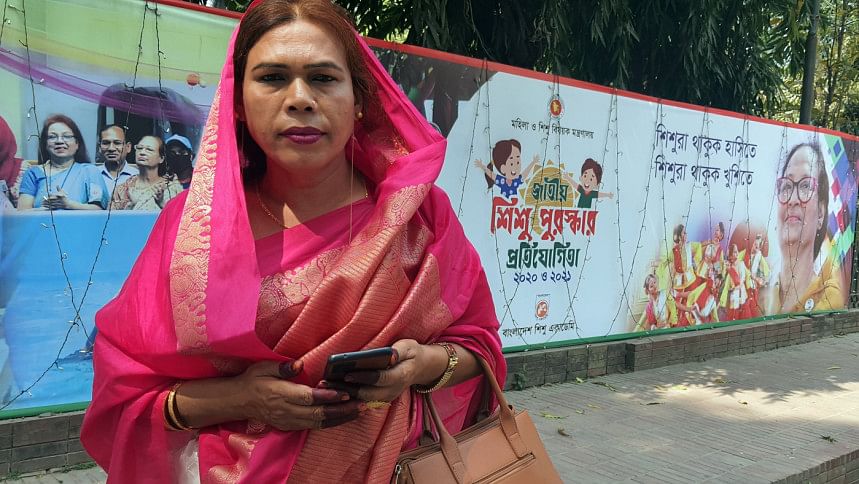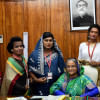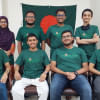Rising above adversity: In conversation with Nazrul Islam Ritu

Nazrul Islam Ritu is the first transgender elected union parishad chairperson in Bangladesh. The 44-year-old activist and politician was born on 15 June, 1979, and lives in Trilochanpur, Jhenaidah District, where she is the chairman of Union 6.
Well-groomed and versed, Ritu was donned in an off-white and red silk sari and light jewellery and simple make-up, when she appeared in the two-day WOW - Women of the World international festival in Dhaka - recently, to celebrate the achievements of women, girls, and non-binary people and look at some of the obstacles they face across the world.
Ritu had to face scorn and strong antagonism in her homestead when she was young. And at the age of 10, she decided to run away from home and take refuge in a transgender community located in Demra Thana, Dhaka. There, her Guru Ma, Dipali, took Ritu under her wing and became a mentor.
"I was taught to dance and sing and whenever there was a wedding or a birth of a baby to be celebrated, our group used to dance. That was my early source of income," Ritu explains, adding that it was also the beginning of her savings.
"I was with the group for a long time, but I always longed for my home and wanted to go back to my roots," she says, adding that she frequently visited Jhenaidah to stay connected with the Trilochanpur people during her sojourn in Dhaka.
In her late twenties, she returned to Trilochanpur and started doing charity work with her savings. From fixing a community tap, and building roads, to helping poor families to get their daughters married off. Her most notable assistance was donating to several local Hindu temples and helping with the construction of two new mosques. Locals said Ritu has been providing financial assistance to the helpless people of different villages of Trilochanpur Union for the last 15 years and thus, becoming well-liked among them.
"My villagers started seeing me in a different light and insisted I contest the union parishad or local government polls. I started my political career in 2020 in Jhenaidah district, and promised to eradicate corruption and uproot the drug menace. I ran as an independent candidate in the elections and won against my opponent, Nazrul Islam Sana, who was supported by the ruling Awami League, with a 2:1 vote ratio. I did not ask for a vote, they voted for me. I got elected for my work, which I was doing for the last 15 years or so," she adds.
The love and support for her are immense in her hometown because of her trustworthiness and honesty.
"I have no family, no kids, I don't need big houses or cars to carry my life. My need for money is even less so; whatever I do, I do it for my village people. They trust that I will not betray them. We are 13 members in the union, including myself, and we work relentlessly for the welfare of the community. I can proudly say we are corruption free," she states.
For her, family means the world, her three brothers and sisters and her Guruma, and she believes family support has bought her where she is now. The trauma of initial rejection has been overcome.
"I have won the election as a transgender person. Now, I want to serve the people of my union for the rest of my life. The government has given the right to vote and access to various opportunities to transgender community members. I have no regret for being a transgender person," she says.
"I am in the mind of my people, my idol is our Prime Minister Sheikh Hasina, I follow her dedication towards her work. If you don't give labour and hard work, you cannot achieve success or fame. I have no intention of going further into general elections, I am happy the way I am today," she says with a smile, as she rushes off to give her speech as the 'Women of the World.'
Almost a decade ago in 2013, Bangladesh gave the country's estimated 1.5 million transgender people the right to be identified as a separate gender in the country. Five years later, they were allowed to register as a third gender when signing up to vote.

 For all latest news, follow The Daily Star's Google News channel.
For all latest news, follow The Daily Star's Google News channel. 








Comments